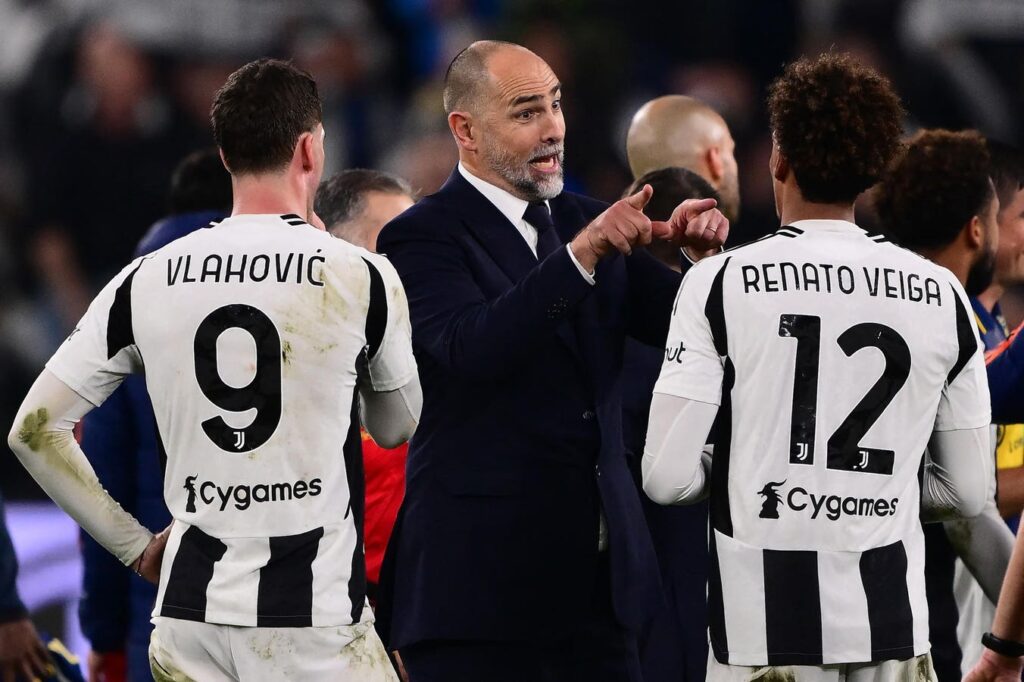Juventus’ Croatian coach Igor Tudor (C) celebrates with Juventus’ Serbian forward #09 Dusan Vlahovic … More
AFP via Getty ImagesBack in May, when Thiago Motta emerged as the leading candidate for the Juventus job, I pointed out that the club has been at far lower ebbs than the one he found them.
As I highlighted at the time, the challenge was there was little room for failure.
The Brazilian was greeted with a treacherous financial situation. Juve lost $133.84 million at the results before his arrival.
But not long into his reign, it became clear the picture was quite a bit worse. In September, the club recorded a $215.52 million loss.
As Juventus was keen to point out in the statement accompanying the figures, the caveat was that these results were “heavily influenced by the men’s First Team’s non-participation in UEFA competitions, as well as by certain non-recurring costs.
“In the 2024/2025 sporting season, Juventus will participate in five competitions (Serie A, Coppa Italia, Supercoppa Italiana, UEFA Champions League and FIFA Club World Cup), with a positive impact on revenues,” it added.
Given that the expanded Champions League format delivered an extra two revenue-boosting games and that the potential prize pot at the inaugural expanded Club World Cup is $125 million, those additional competitions will give Juve’s finances a much-needed boost.
The problem is, as last season’s absence from European competition demonstrated, you need to keep qualifying for the Champions League to keep the money flowing in.
Motta was not far from that goal in terms of points. When he was fired, the club was fifth in Series A, one point behind the manager’s former club, Bologna, and with Lazio and AS Roma in close proximity.
The hierarchy got jittery, however, after a couple of bruising defeats. Juve was routed 4-0 on home turf against Atalanta and thrashed 3-0 at Fiorentina.
That came off the back of being dumped out of both the Champions League and the Coppa Italia.
In addition to that rotten run, the suggestion was that Motta’s flexible, enterprising style, which won plaudits at Bologna, was not translating to Turin.
Italian-American soccer journalist Gabriele Marcotti was one of many who believed he “had to go,” in part because he’d never quite grasped the enormity of his task.
“Juventus isn’t just any club,” Marcotti wrote for ESPN.
“There’s a lot that comes with the role, and he never quite seemed to understand that it goes beyond simply sending out a lineup and making substitutions.
“Whether it was throwing his players under the bus after the Coppa Italia defeat, giving off perpetual ‘lack of urgency’ vibes — reportedly, it’s what prompted the club to sack him after a lunchtime meeting last Friday in which he appeared detached — or deteriorating relationships with many players (as of Monday early afternoon, 24 hours after his departure, just one had taken to social media to thank him), Motta seemed to have a knack for saying the wrong thing or affecting the wrong image, both internally with the players and externally with the fans.”
As Marcotti pointed out, some confusion on the field, where players seemed constantly switched around or jettisoned entirely, didn’t help.
“There’s a lack of clarity to what Motta was trying to do. It’s one thing to be flexible: it’s another thing when your own guys don’t understand what you’re trying to do,” he wrote.
Whether that is all the Brazilian coach’s fault is another matter. Although he might have pushed the limits regarding his tactics, he’s probably had a trickier roster of players than most of his predecessors.
TURIN, ITALY – DECEMBER 29: Thiago Motta, Head Coach of Juventus, reacts during the Serie A match … More
Getty ImagesThe criticism is also that he didn’t, ironically, adapt well enough himself.
As Italian journalist Mina Rzouki told the BBC: ”We can’t blame Thiago Motta for some of the choices of which players were brought in, but it was almost like he continued to double down on his tactics, regardless of the fact it seemed like he lost the dressing room when it came to absorbing those instructions of how he wants to play.
“He refused to be pragmatic in any way shape or form and I think when you have the second youngest team, that were now losing confidence, and yet you still double down on your philosophy.
“I think he made some huge mistakes despite the fact he had a brilliant time at Bologna.”
Perhaps the most stinging criticism is what the players had to say about interim boss Igor Tudor, who has already stopped the rot with a 1-0 win against Genoa.
“Coach Tudor motivated us to show our strength on the pitch, always playing for our teammates: only in this way do victories come,” said Khéphren Thuram.
“It’s very important to have the fans on our side: it’s like a family, we heard them and I’m very happy when they sing and are on our side. In the dressing room, we told each other that we have to start winning again because the goal is to be back in the Champions League next year.
“I don’t know if there is something different compared to previous weeks, in the last few days we looked at ourselves in the mirror, we talked to each other because we knew that it was not normal to lose two games like that if you are at Juventus and today we saw that the attitude was different.”
For all his tactical nous, it’s an indictment on Motta that he could not call upon the players to do the same.
Juventus will hope Tudor will continue in this vein as a club because while the next financial results look rosier, the hierarchy won’t want to lose the progress the club has made.
Read the full article here


